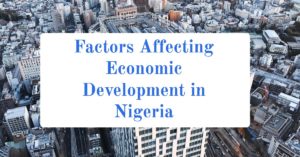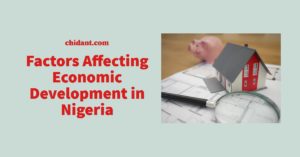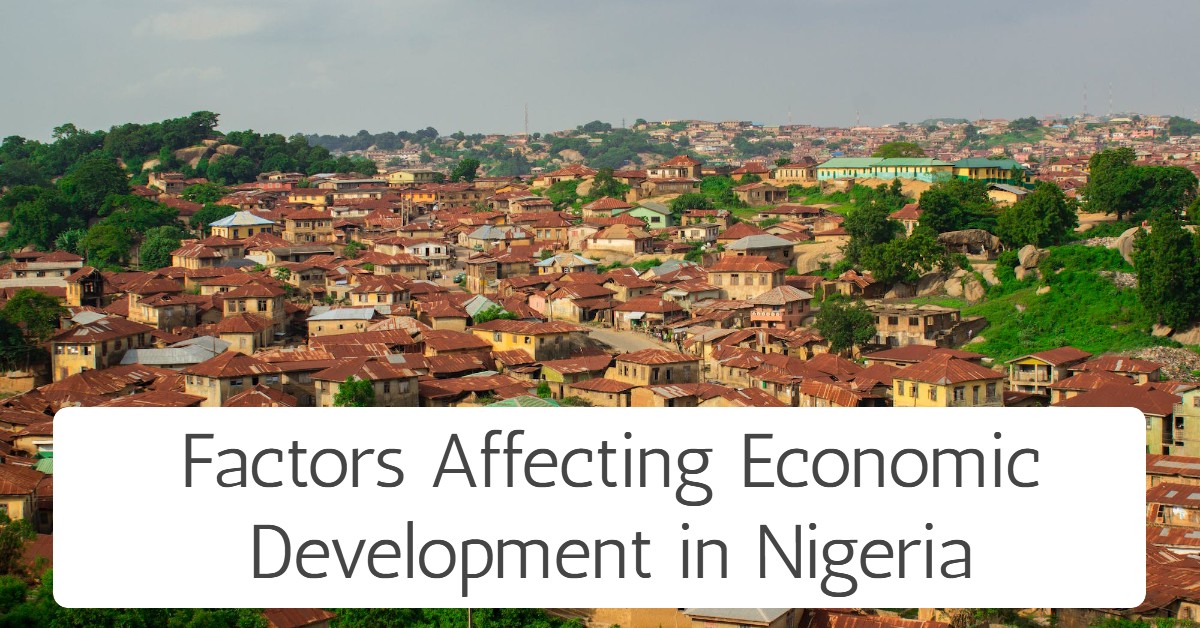Nigeria is a nation so blessed but poorly developed. What is responsible for this ugly narrative? To better put, what are the factors affecting economic development in Nigeria?

This article on factors affecting economic development in Nigeria is a must-read!
What is Economic Development?
Development, they say, is a process. It simply means continuous changes for the better.
Hence, economic and social development is the process of improving a nation’s, region’s, local community’s, or individual’s economic well-being and quality of life in accordance with specific goals and objectives.
- growth in the size of the workforce and
- growth in the productivity (output per hour worked) of that workforce.
For there to be steady economic development, there must be a degree of political stability, investment and a mixture of public and private initiatives to increase economic potential.
The Current Situation in Nigeria

Nigeria is the most populous country in Africa, blessed with an abundance of natural, physical and human resources.
But the present reality is Nigeria is a nation with a weak economy, a high rise of insecurity and violent conflicts.
According to foreignpolicy.com (accessed here), Nigeria has been described as a failed state.
The current reality (among many others) includes the following:
- poor standard of living
- high cost of living
- high rate of unemployment
- inflation
- corruption
- insecurity
- poor educational development
- religious disagreements and crises
- Bad governance
It is, therefore, pertinent for us to critically examine the factors affecting economic development in Nigeria.
Factors Affecting Economic Development in Nigeria
The main factors affecting economic development in Nigeria include but are not limited to the following:

1. Insecurity: Political Instability, Terrorism and Insurgency
Let’s critically examine these three inter-related issues closely:
Political Instability
Political unrest has long hampered Nigeria’s economic development.
Private property protection and political stability are the most important factors in encouraging firms to invest in developing economies.
Any indication of insecurity raises the economic and personal risks of investing in developing countries like Nigeria.
Prolonged civil unrest/conflict is the most significant impediment to development in Nigeria because it causes investment to dry up and resources to be wasted in ineffective ways.
Terrorism
International investors are scared away by insecurity in any country. Many foreign investors avoid Nigeria, and some who are already there abandon their investments due to the country’s high rate of terrorism and kidnapping.
Nigeria has become notorious for being the home of the world’s second most lethal terrorist group, after ISIS.
Nigeria has been tarnished as a result of Boko Haram, Fulani herdsmen, sea pirates, militants, and kidnappers who kill and maim innocent citizens.
Insurgency
Boko Haram in the North East and militancy in the Niger Delta are two major factors affecting Nigeria’s economic growth.
The kidnapping and blowing up of major pipelines transporting crude oil for export, as well as disruptions in crude oil production of 2.2 million barrels per day, nearly crippled the nation’s economy when it was reduced to half.
2. Over-Dependence on Oil
Nigeria’s economy is entirely dependent on foreign exchange earnings from the sale of crude oil and natural gas. The country’s economy will remain poor until it diversifies its sources of earning foreign exchange to sectors such as agriculture, manufacturing, solid minerals, tourism, and other sectors.
3. Over-Dependence on Import
Nigerians’ overdependence on imported goods is one major reason for the poor economic development of the country.
Because of this unusual taste and reliance on imported goods for consumption, Nigeria imports basic things such as buttons, thread, matches, torch lights, and tooth-pick.
Over-dependence on imported goods kills our local industries and adversely affects the nation’s foreign exchange.
Some Nigerians see the use of imported products as a status symbol. They believe eating imported corned beef, Uncle Ben’s Rice, and Baked Beans and drinking exotic wines identifies them as high-class citizens.
From another perspective, the lack of a constant power supply makes importation cheaper for companies. Also, it has led to the relocation of some manufacturing companies out of the country.
Nigeria needs to produce and consume more local products going forward!
4. Poor Infrastructural Development
Poor Infrastructure, such as lack of good transport system, constant power supply and housing, hinders businesses and economic development in Nigeria.
The problem with poor infrastructure is that it doubles the cost of production and sale of finished goods in Nigeria.
For there to be economic progress, the roads, trains and water transport system needs investment and repairs.
There is also a need for a consistent power supply for businesses to be more profitable.
5. Level of Education, Training and Technical Know-how
Levels and standards of education have a significant influence on labor productivity.
Without basic literacy and numeracy, it is difficult for an economy to develop from manual labor to new higher-tech industries in the service sector.
There is, therefore, a need for massive investment in human capital development.
6. Macroeconomic instability
Macroeconomic stability, like political stability, encourages investment and development.
This entails low inflation rates and stable exchange rates.
Rapid depreciation can result in capital flight and a fall in growth.
Let’s examine the impact of inflation and high exchange rate on the nation’s economy:
Inflation
Inflation is defined as a continuous rise in the price of scarce goods and services in the market. When this occurs, you purchase the same number of products that you would normally purchase with large sums of money.
In economics, inflation simply refers to higher prices caused by an increase in the supply of currency or credit relative to the ease of access to goods and services, which causes prices to rise and reduces people’s purchasing power.
Inflation causes a variety of social issues, including armed robbery, prostitution, insecurity, unemployment, recession, high-interest rates, and so on.
High-Interest Rate
High-interest rates cause economic distortions, slow business growth, and prevent consumers from borrowing to finance development projects, new businesses, personal loans, and home improvements.
For example, due to the high-interest rates prevalent in the Nigerian financial sector, Small and Medium Enterprises (SMEs) are unable to obtain credit to expand their businesses, and those wishing to start new businesses find it difficult to obtain loans.
As a result, there is a high rate of unemployment, frustration, and the cost of imported consumer goods is high.
However, if interest rates fall, it will result in the growth and expansion of local industries, the creation of jobs, and a reduction in inflation or the cost of living.
Read More: List of Health NGOs in Nigeria
7. Regional effects
The development of economic neighbors has a significant impact on a state’s economic growth.
Southeast Asia, for example, experienced rapid growth and development in the 1980s and 1990s. Sub-Saharan Africa, on the other hand, grew at a snail’s pace.
This is in part because of the gravity effect, which holds that trade with nearby neighbors is the most profitable and efficient. Increased trade and investment are common spillover effects when a neighbor does well.
8. Poor Utilization of Natural Resources
The link between natural resources and development is not straightforward.
According to one theory, raw materials can cause a “resource curse,” in which an economy becomes enslaved to producing primary products with no incentive to diversify.
This is the case in Nigeria, which is overly reliant on oil, causing other sectors of the economy to suffer.
9. Corruption
The problem of corruption in Nigeria cannot be overstated. Frequent newspaper reports of the Economic and Financial Crimes Commission quoting large sums of money allegedly stolen by former government officials.
Bribery and corruption are prevalent in almost all sectors of the country, contributing to the country’s poor economic development.
Corruption has a daily impact on the economy, increasing the cost of government projects, causing contractors to perform subpar work, deteriorating the country’s infrastructure, allowing unqualified students to gain admission to universities, and so on.
10. Red Tape
Excessive bureaucracy or adherence to official rules and formalities is referred to as red tape.
The government is slowed and more expensive as a result of red tape.
Because of the system’s red tape, getting anything done in Nigeria is much more expensive. Paying taxes, for example, is difficult, as is clearing your goods at ports, and registering a new business is difficult.
Furthermore, despite treaties signed with members of the Economic Community of West African States, you cannot freely move goods or trade across borders due to Nigeria’s inability to enforce contracts (ECOWAS).
You cannot celebrate any Ministry, Department, or Agency of Government in Nigeria due to the poor state of service in these government establishments.
To confirm this claim, Word Bank’s Doing Business Index, 2021, places Nigeria at 131 out of 190 countries.
11. Devaluation of the Naira
The naira’s value is a factor hindering Nigeria’s economic development.
All businesses in Nigeria depend on knowing how much the naira is worth in other currencies at any given time in order to effectively plan, produce, import raw materials, and sell finished goods.
Government-printed money and supply, whether industries are productive or reliant on imports for raw materials, and how raw materials are sourced, all affect the naira’s exchange rate. All of these variables have an impact on the currency’s value.
The purchasing power of money is devalued when it is printed in greater quantities.
As consumers buy more imported goods, this will have a negative impact on local businesses that are unable to compete because of the high cost of producing local alternatives. A buildup of unsold stock will lead to the demise of businesses as a result.
The stronger the naira, the lower the prices of products made by companies that rely on inputs from other countries. If the naira is weak, products that rely on foreign inputs and raw materials will become more expensive.
A fall in the value of the Naira could lead to a decrease in manufacturing output, or a rise in the value of the Naira could lead to an increase. It is for this reason that Nigeria’s economy relies heavily on the Naira’s strength and stability.
12. Government Regulation
Government regulation is part of the factors affecting economic development in Nigeria.
State regulation is necessary to maintain the standards that all operators in an industry must adhere to in order to ensure the safety of consumers, employees, natural resources, and the environment.
The government enforces safety standards to ensure that economic growth does not harm the environment.
Some areas of focus include medicine, food, health, the oil sector, and the financial sector, among others.
Excessive regulation may harm small and medium-sized businesses, as well as large corporations, and cause an economic downturn.
Some policy pronouncements in the banking sector by the Central Bank of Nigeria are examples. Three examples are the elimination of commission on turnover, the reduction of fees for withdrawing funds from another bank’s ATM machine, and the ban on cryptocurrency.
These policies may have reduced bank profitability and resulted in the sacking of many bank employees by major banks, worsening Nigeria’s unemployment situation.
Additional: International Funding for Projects in Africa: Biggest 25 Opportunities
Conclusion:
Other factors that affect economic development in Nigeria are poor levels of inward investment, low levels of savings/capital, labor mobility and inability to process raw materials into finished goods.
To ensure sustainable economic development in Nigeria, these pertinent issues should be looked into and workable solutions implemented. As the saying goes, a country is as developed as its leaders. Good leadership is the answer to Nigeria’s economic, social and political woes.
For comments and contributions, please, use the comment section.
Thank you for reading through.
Recommended:
Top 85 Profitable Businesses to Start With 100K
Top Real Estate Companies in Nigeria 2023

